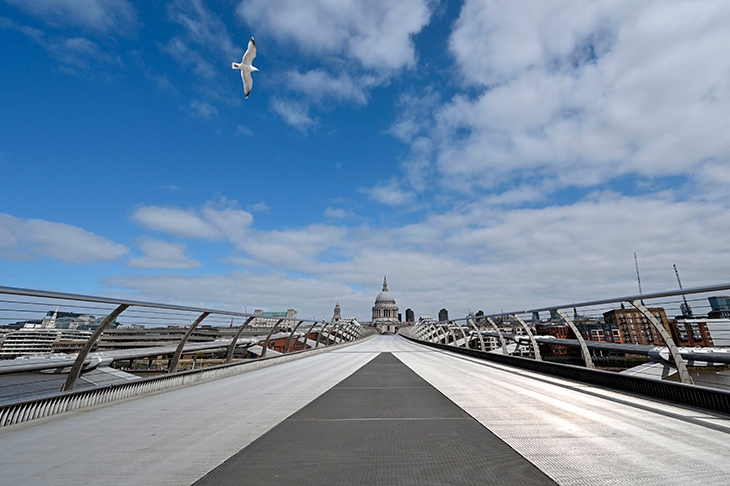Some Leavers are perturbed that Lord Frost was suddenly stood down as the next National Security Adviser. This anxiety may be misplaced. If he gets the necessary authority in No. 10, his new job of making our European policy fit with our entire foreign policy and making both serve a sovereign nation will be just what is needed. More discouraging, though, is his replacement choice at the NSC. Sir Stephen Lovegrove comes from the Ministry of Defence but is more renowned for tweeting the hashtag of Black Lives Matter and getting generals into rainbow lanyards than for helping the armed services adjust to war in the information age. His appointment is a victory for the Blob over Boris’s attempts at reform. National security in the face of ‘Westlessness’ and the rise of China needs so much more than virtuous HR.
Throughout Covid, I have been neither a lockdown sceptic nor an ardent supporter. The question seems finely balanced to me. My doctor friend who reports from the front line constantly assists those with severe Covid, so I am struck by his latest dispatch. ‘Although lockdown has almost certainly averted a disaster this time around, I am concerned that its costs are not being counted… therefore I am slowly compiling examples of harm that I have witnessed.’ One such: ‘An 88-year-old man who has been married for 62 years to the girl next door. He came into hospital very frail. His wife had gone into a nursing home before the first lockdown with dementia. He could not see her because he was not allowed out, and no one was permitted into the home. Their few Zoom conversations didn’t work, due to their mutual deafness and her dementia. As she was dying in July, alone among strangers, he begged to be with her, but was not allowed. It broke his heart and he declined rapidly. When he got a letter inviting him for a vaccine, he said: “Why am I allowed to go out for a vaccine but not to see the woman I loved more than life itself?” He refused the vaccine and days later became very unwell with a urinary tract infection. He has now died. The lockdown intended to protect that man destroyed his life and made it meaningless.’ We should not ignore such examples.
The National Trust owns Kedleston Hall. Its former owner, Lord Curzon, ensured that it went to the Trust. So far as I can see, this generosity is not mentioned by the Trust on its Kedleston website. The house’s Eastern Museum and the website have been revamped after what the latter calls a ‘Year of Listening’ to ‘local communities’ and ‘national thought-leaders’. The website offers a biographical ‘essay’ about Curzon, which mentions his ‘racist ideology’ and signs off with a quotation: ‘There was never a man so bereft of conscience, of charity or of gratitude.’ Noticing that some facts in the essay were wrong, but being no Curzon expert, I emailed his biographer, David Gilmour. David said he was in the middle of writing to the Trust to correct its website’s errors and omissions. For example, Curzon was not ‘relegated to the backbenches’ in 1898: he was made Viceroy of India. He did not convert the ground floor of Kedleston into the museum in 1927: he had been dead two years. He did not make ‘colonial’ expeditions to Persia, Russia and Korea before becoming viceroy. None of these places was a colony, and Curzon visited them as an independent traveller. The website says he was asked to ‘stand down’ as an MP at the 1906 election: he was not an MP at that time. And so on. Except for a passing reference to his help with the Taj Mahal, the essay makes no mention of Curzon’s widespread restoration work all over India (often paid for out of his own pocket). Nor does it record his munificence in buying, restoring and giving to the Trust two other places in England — Tattershall and Bodiam — and in restoring another which the Trust took over, Montacute. This treatment of one of the Trust’s greatest benefactors feels ‘bereft of conscience, of charity or of gratitude’. The persistent inaccuracy is part of this: one notices that the people currently writing woke pieces for organisations — colleges, learned societies, the National Trust etc — which criticise their own institutional forebears are rarely well informed. This suggests they are out to condemn, rather than to educate, and that the people who run the institutions do not mind.
The Times is changing its style of describing people. ‘We will no longer be according people courtesy titles at the second mention on Times news pages,’ say the paper’s new rules. Thus Lord Adonis would become, on second mention, ‘Adonis’, and ‘The Archbishop of Canterbury, the Most Reverend Justin Welby’ would dwindle to ‘Welby’. Until now, the first would have remained ‘Lord Adonis’ throughout and the second would have been ‘Mr Welby’. In the old style, Severus Snape would have appeared thus at first mention, but become ‘Professor Snape’ at second. Now he has his professorship at first mention and afterwards becomes merely ‘Snape’. This brings the daily paper in line with the Sunday Times. Is that such a brilliant idea, in print at least? Sunday paper style has always been freer than that of the daily. In a ‘paper of record’ like the Times, it seems almost rude to call Theresa May ‘May’ or Sir David Attenborough ‘Attenborough’. In an age when people are increasingly worried by aggression in all media, don’t ‘courtesy’ titles and honorifics (used within reason) preserve courtesy? It is that bit harder to insult someone if you know you must keep calling them ‘Mr’, ‘Mrs’, ‘Ms’, ‘Lord’ etc throughout. Besides, the more po-faced the rules, the greater the inherent comedy. I never fail to laugh (grimly) when hearing of ‘Sir Jimmy Savile’, and it is funnier still if he is referred to as ‘Sir James’. The phrase ‘Sir Elton’ is much funnier than just plain (second mention) ‘John’.
Got something to add? Join the discussion and comment below.
Get 10 issues for just $10
Subscribe to The Spectator Australia today for the next 10 magazine issues, plus full online access, for just $10.
You might disagree with half of it, but you’ll enjoy reading all of it. Try your first month for free, then just $2 a week for the remainder of your first year.















Comments
Don't miss out
Join the conversation with other Spectator Australia readers. Subscribe to leave a comment.
SUBSCRIBEAlready a subscriber? Log in